The fourth star of Marshal Zhukov
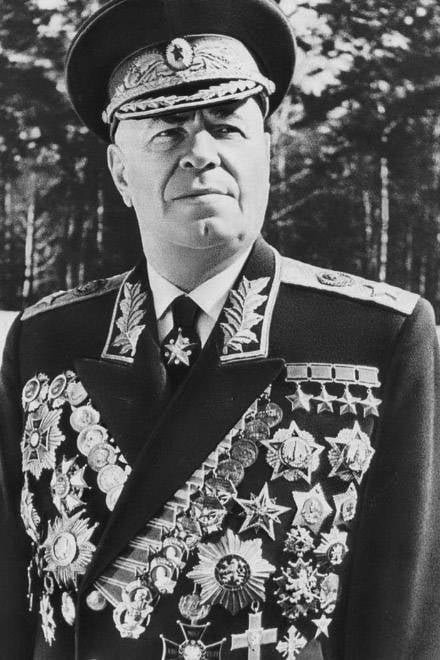
On November 7, 1956, as usual, a military parade was held in Moscow on Red Square in honor of the next anniversary of the October Revolution. He was received by USSR Minister of Defense Marshal of the Soviet Union G. K. Zhukov. Confidently rising to the podium of the mausoleum and uttering the words of a festive greeting, he seemed to be carefully watching the minting step of the infantry square and the columns of the formidable military equipment. But mentally, he and the rest of the presidium of the Central Committee of the CPSU, who stood with him on the podium, were far from Red Square. At this time, many hundreds of kilometers from the festive Moscow on the streets of the Hungarian capital of Budapest, there were battles involving thousands of Soviet soldiers. It was November 7 that expired the three-day period in which the marshal promised the country's leadership to defeat the "counter-revolution" in Hungary ...
Alarming October 1956 of the Year
After the XX Congress of the CPSU, which took place in February 1956, at which the Stalin personality cult was debunked, the pro-Soviet regimes of the countries of people's democracy were to undergo a difficult test of strength. No less difficult tests fell on the share of Soviet troops stationed in these countries.
In October, 1956 of the year exacerbated the struggle for the democratization of socialism in Poland and Hungary, where mass rallies and demonstrations were held everywhere. And if the Polish party leadership compromised with Moscow, thereby preventing Soviet military intervention at the very last moment, in Hungary the events took a completely different, hard turn.
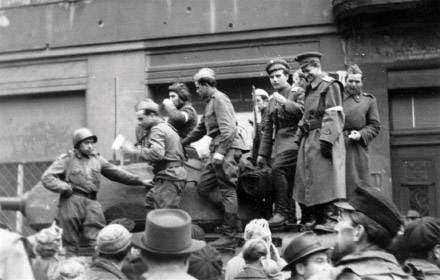
The beginning of October 23 students turned into an armed anti-communist uprising. And the introduction of a special corps of Soviet troops led by Lieutenant-General P. N. Lashchenko to Budapest gave it the character of a national liberation revolution. Persistent fighting broke out in various parts of Budapest, which became the center of resistance. In the six days of fighting in the city, Soviet troops lost about 350 people killed and more than 60 units of military equipment. The Kremlin was forced to admit that the uprising was beginning to be of a massive, popular character. The entire system of government of the Hungarian Communists in the capital and in the field collapsed before our eyes. Of course, for the Soviet leadership it was a shock. Marshal Zhukov at the presidium of the Central Committee of the CPSU was forced to declare: “... Anti-Soviet sentiment is wide. To withdraw the troops from Budapest, if necessary - to withdraw from Hungary ... To persist further - it is not known what will lead ... ”. Under these conditions, it was decided to withdraw the Soviet units from Budapest on October 30.
And yet in Moscow they hesitated whether to leave Hungary or not. The decision was influenced by the foreign policy factor - NATO countries and Israel attacked Egypt in order to capture the Suez Canal. Also influenced by the position of the ambassador of the USSR in Hungary Yu. V. Andropov, who believed that if the USSR did not provide armed assistance, Hungary would become a victim of NATO aggression.
The bloody acts of violence of the opposition against the Hungarian communists also played their part. The power decision became inevitable, and after Imre Nadia’s government openly broke up with the socialist camp, it was decided to create a “revolutionary workers 'and peasants' government” headed by Janos Kadar, to overthrow Imre Nagy and conduct a military operation to suppress the armed “counterrevolutionary rebellion”.
The birth of "Whirlwind"
The plan of the operation, called "Whirlwind", was developed under the leadership of the Minister of Defense of the USSR G. K. Zhukov. It was then that the marshal promised N. S. Khrushchev to solve the Hungarian problem within three days. The overall leadership of the operation was entrusted to the commander-in-chief of the joint armed forces of the Warsaw Pact member states, Marshal I. S. Konev. His headquarters was to be located in the city of Szolnok.
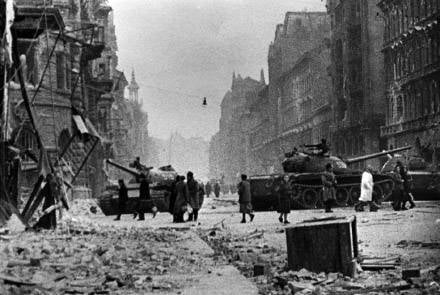
In addition to the troops of the special corps in the Budapest region, it was proposed to introduce the 38 Army of Lieutenant-General H. U. Mamsurov into Western Hungary, and the 8 Mechanized Army of Lieutenant-General A. Kh. Babajanyan from the Carpathian Military Army into the territory of Eastern Hungary District The troops of these armies were tasked with blocking and disarming the Hungarian units outside the borders of Budapest and taking control of the main centers in the country's 19 provinces. The airborne units in the upcoming operation were to capture and take under protection the Hungarian airfields.
More than 15 people took part in Operation Whirlwind. tank, mechanized, rifle and air divisions, 7th and 31st airborne divisions, a railway brigade with a total number of more than 60 thousand people. They were armed with over 3000 tanks (moreover, the more modern T-54s prevailed in the troops).
According to the “Whirlwind” plan, a special building in the 2 Guards. MD General Major S. V. Lebedev, 33 Guards. MD Major General G. A. Obaturov and 128 Guards. Colonel N.A. Gorbunov was supposed to use the Thunder signal, using the October combat experience and knowledge of the city, to seize bridges across the Danube, Gellert Mountain and the Budai Fortress, parliament buildings, the Central Command of the HVAC, the Ministry of Defense, the police department, occupy the Nyugati railway stations and Keleti, the square of Moscow, the headquarters of the resistance in the cinema "Korvin", the radio station "Kosut". To capture these objects in all divisions, special detachments were created as part of an infantry battalion, they were given 150 paratroopers on armored personnel carriers, reinforced with 10 – 12 tanks. In these detachments were responsible officials of state security organs: Major General K. Ye. Grebennik, later appointed military commander of the city, Major General P. I. Zyryanov, famous Soviet illegal immigrant A. M. Korotkov. They were to organize the seizure and arrest of members of the government of Nagy and the leaders of the “insurrection”.
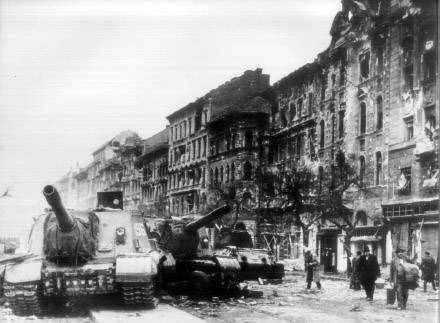
In addition, the corps’s task was to block military sites and approaches to Budapest. The corps were reinforced by two tank regiments, two parachute regiments, one small, mechanized and artillery regiment, as well as two divisions. The headquarters of the rebels, it was decided to apply a massive bomb strike by the forces of the air regiment of Tu-4 long-range bombers.
Parts of the Airborne Forces began to operate on October 30, 114 Guards. pdp xnumx gv. The airborne unit was landed by landing method from Lviv and Khmelnitsky to the airfield Veszprém (in 31 km south-west of Budapest), and in the late evening of the same day 100 parachute was transferred there.
The evacuation of the families of Soviet servicemen began, as well as preparations for the evacuation of workers of the Hungarian party organs and state security.
3 in the evening on the Tekel airfield was transferred to 108 Guards. pdp in full force, and from Mukachevo 80 made pdp.
About the movement of Soviet troops became known in the camp of the rebels from the locals. The rebels began to seriously prepare for defense. They were armed not only small weapon and bottles with a combustible mixture, but also anti-tank and anti-aircraft guns. Armed groups received reinforcements, a defensive belt was built around the capital. Outposts with tanks appeared on the outskirts of Budapest, military patrols appeared on the streets. The number of Hungarian units in the city reached 50 thousand people, in addition, more than 10 thousand people were part of the National Guard under the command of General Bela Kirai.
At the disposal of the rebels were about 100 tanks. Despite the fact that the situation threatened to get out of control, the government of Nagy did not stop its work. On November 1, an emergency meeting of the Hungarian Council of Ministers was held, at which the resolution on the country's withdrawal from the Warsaw Pact and the declaration of Hungary’s neutrality were unanimously adopted. Ambassador Andropov was handed a note demanding the immediate start of negotiations on the withdrawal of Soviet troops from the territory of Hungary. The Soviet side agreed to discuss this issue on November 3 at its Tekel military base, where members of the Hungarian delegation headed by Defense Minister Pal Maleter arrived, where they were arrested by KGB officers led by Army General I. A. Serov.
On the signal "Thunder"
The assault on Budapest began in the early morning of November 4, 1956, from a massive shelling of the main resistance fighters of the rebels.
Then the tank columns rushed forward to capture the bridges and the main supporting centers of resistance. The infantry, supported by tanks, began clearing urban areas. Fighting immediately took a fierce and uncompromising character. Successfully operated in the northeast of the city part of the 2 Guards, which seized bridges across the Danube, the Parliament, the Central Committee of the Party, the Vogt arsenal, where they disarmed up to 600 people and captured around 100 tanks, two artillery warehouses, 15 guns. More than 30 firing points were suppressed.
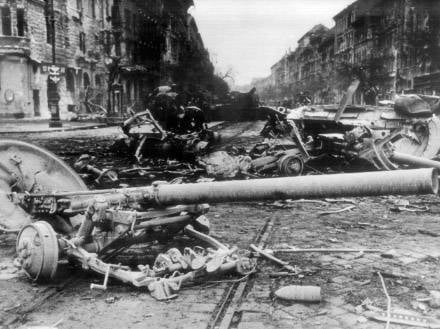
In the west of Budapest, parts of the 128 Guards. Sd captured the airfield Budaersh (22 aircraft), the barracks of the school of communication, disarmed the regiment of the Hungarian 7 th fur. divisions. In the area of the square of Moscow, armed resistance was exerted by detachments under the leadership of Janos Sabo, former commissioner in the Red Army Bela Kun and former driver Imre Nagy. Here she was ambushed and suffered heavy losses in reconnaissance as a part of the motorcycle platoon of Senior Lieutenant I. Ya. Karpov. The seriously wounded officer was captured, where he was brutally tortured: his head was pierced, his eyes were punctured. And although intelligence data helped to clear the square by 5 in November, fighting with small groups of rebels in the area continued until November 9.
Especially bloody battles, as expected, turned around the cinema "Corvin", the square of Zhigmond, the royal palace in areas 33 Guards. md and xnumx gv. sd. Here, in order to support them, airborne units were involved, which in the difficult conditions of the dense urban environment were assigned the leading role. Thanks to their clear coordinated actions, the main residential areas of Budapest were promptly cleaned. Units, assault groups, capture groups sometimes operated independently without the support of tanks and artillery; more than once the paratroopers had to engage in hand-to-hand combat.
November 4 early morning 31 Guards. the airborne forces launched an attack to capture the city of Veszprem. By 10 hours, parts of the division managed to occupy military camps near Veszprem, but only in the afternoon the paratroopers managed to take control of the city itself.
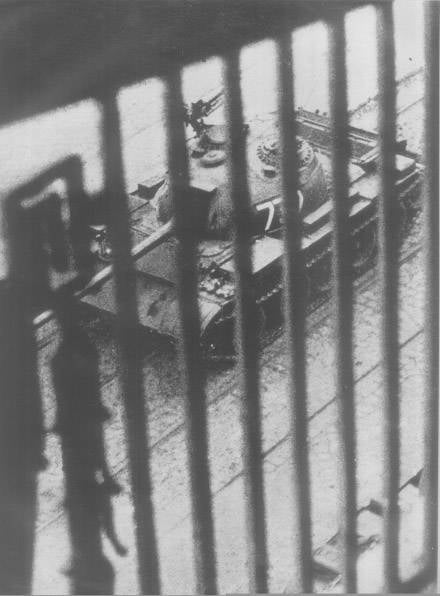
The seizure of anti-aircraft batteries of the Budapest air defense system was carried out by six 108 paramilitary combat groups. One of the combat groups in the reinforced company numbering 90 people, having traveled off-road for more than 30 kilometers, crossed the Danube, carrying all their weapons. The group seized two batteries, a significant amount of weapons and ammunition, incapacitated weapons, captured 96 officers and soldiers.
November 4 day was key for the whole operation. In the center of the city, Soviet troops met stubborn resistance. They had to use flamethrowing weapons, incendiary and smoke projectiles. Significantly were reinforced assault groups. Fearing numerous civilian casualties in Budapest, the Soviet command canceled the aerial bombardment of the city, deploying Tu-4 planes already in the air.
At the same time, the units of the 8 th mechanized and 38 th army armies successfully operated in the rest of Hungary.
Having captured the cities of Szolnok, Gy ,r, Debrecen, Miskolc, they disarmed 15 Hungarian divisions and 5 separate regiments (more than 25 thousand military personnel) and captured the entire Hungarian Aviation at the airfields. This was facilitated by the fact that the personnel of the Hungarian army remained mostly neutral, for example, in Budapest, only 3 regiments, 10 anti-aircraft batteries, several construction battalions resisted the Soviet troops. An important role was played by the voluntary surrender of 13 generals and more than 300 officers in the building of the Hungarian Ministry of Defense.
Fiery "Whirlwind" on the streets of Budapest
In the city, the main focus of resistance was the Corvin cinema, where the opposition headquarters remained impregnable. Its round building was conveniently located inside a ring of multi-storey buildings and was a strong point reinforced with two 85-mm guns, tanks, anti-aircraft machine-gun installations and a garrison of 359 people. Opposite was the barracks to them. Kiliana, where a battalion of armed military builders acted, put up stubborn resistance. Several Soviet attacks were repulsed with heavy losses. 3 th company 108 Guards. pdp commanded by guard captain N.I. Kharlamov managed to rush inside and, leading the battle for 24 hours, by the morning of November 5, with the support of 80 tanks and paratroopers, take control of the barracks, where the company disarmed the 125 man and seized many weapons.
By November 15 5 clock for the assault on the cinema "Corwin" were involved tank and mechanized regiments 33 Guards. MD, reinforced parts 108 and 80 Guards. pdp also attracted 11 artillery battalions, which included about 170 guns and mortars. Persistent battles continued throughout the day, attacks followed both day and night. Detachments under the leadership of István Kovács, Gergey Pongratz, defended here, and artillery fire was commanded by Janko Mes skillfully commanded by Janko wooden leg. Only in 21.00 6 in November began the final assault, in which the battalion of 71 guards distinguished. tank regiment. Zapolit battalion, the commander of the assault squad captain N. M. Yakupov, being seriously wounded, a bunch of grenades destroyed an anti-tank gun, sheltered in the basement. The crew of the T-34 tank, commanded by Senior Sergeant A. Balyasnikov, at full speed, rushed into the stronghold and immediately destroyed two guns, four DShK machine guns and up to 30 defenders.
The tank was shot down, but the crew continued to fight with personal weapons and grenades, which allowed the assault group of paratroopers Captain N. I. Kharlamov, with the support of tank platoon of Lieutenant S.Svik in the aisles formed in the walls after the shelling from tank guns and hand grenade launchers, break into the building of the cinema and crush the remnants of resistance by the morning of November 7.
The fighting continued in other parts of Budapest. Soviet troops acted decisively under the impression of numerous incidents of insurgent atrocities against supporters of the authorities and reprisals against captured Soviet soldiers. With unexpectedly stubborn resistance, parts of 128 Guards had to face. Sd and battalion 381 Guards. pdp on Zhigmond Square, where was one of the most powerful resistance nodes with 12 tanks and 10 anti-aircraft guns. On the square, Soviet soldiers were met with hurricane fire from balconies and barricades. But the enemy’s firing points were suppressed by return fire from tanks and recoilless guns. Zigmond Square was cleared, the stronghold captured. The paratroopers destroyed the 223 rebel, the 3 tank, the 1 gun; captured 143 rebel, 9 tanks and 9 anti-aircraft guns.
During 7 and 8 on November, Soviet troops took control of a government radio station for them. Kossuth, campus, prison, all transport communications and communications facilities. By this time most Hungarian fighters ran out of ammunition.
In order to detect the remaining foci of resistance and reduce losses, it was decided to conduct aerial photography of the entire Budapest in the morning of November 7 by four reconnaissance aircraft IL-28. During the assignment over the island Chepel one aircraft was shot down, his crew was killed.
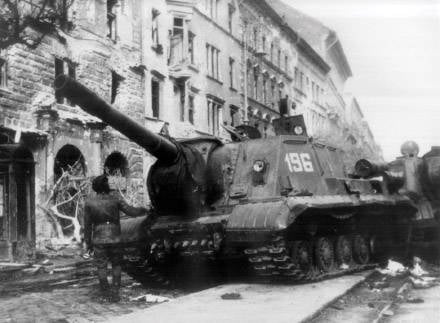
However, according to intelligence data, the Soviet command was expecting an unpleasant surprise: it became clear that after the defeat of the insurgents in the city center, resistance began in the working-class suburbs of Budapest on the industrial outskirts of Chepel, the country's largest metalworking plant, and Ujpest.
Starting from November 7, Soviet artillery hit the resistance centers, but the Chepel workers refused to surrender their weapons twice and fought off attacks until November 10 morning when the workers councils asked for a ceasefire. By November 11, armed resistance was broken not only in the capital, but in fact throughout the territory of Hungary. To establish order, the 12 Motorized Rifle Regiment of the Interior Ministry troops was transferred from the USSR to Budapest. During the fights and after their termination more than 44 thousands of weapons were withdrawn from the rebels and the population, of which 2 thousands of units of modern foreign production.
Having stopped the open struggle, the remnants of the rebel detachments went into the woods in order to create partisan groups, but as a result of the continuous search of the area together with the Hungarian officer's regiments, they were finally eliminated by the end of the year.
1956 Cold Winter of the Year
Only 18 days story led the Hungarian revolution 1956 of the year. It was a city revolution — a revolution of students and workers who were not supported by the majority of the Hungarian peasantry. The civil war was averted, but the price paid for it was high: more than 2,5 thousands of Hungarians died, about 20 thousands were injured, over 200 thousands of Hungarians left the country. The country suffered tremendous economic damage; more than 3 thousands of buildings were destroyed. During the repression, more than 13 thousands were sentenced to various prison terms, and about 350 people were subjected to the death penalty, including the leaders Pal Maleter and Imre Nagy.
Marshal Zhukov kept his promise to the political leadership of the USSR. With swift and decisive actions, the Soviet army cut the Hungarian "knot", showing the world the determination to protect the integrity of the Warsaw Pact Organization by any means.
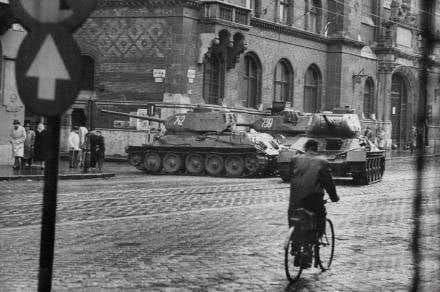
As a result of the 10 hostilities, thousands of soldiers were awarded orders and medals, 26 people were awarded the title Hero of the Soviet Union, 14 of them - posthumously. Alas, the losses of the Soviet troops were heavy: 669 killed, 51 people were missing, more than one and a half thousand were injured.
1 December 1956, his fourth Star of the Hero will receive and Marshal Zhukov. And although he was officially awarded for his 60 anniversary, everyone understood that this was a reward for the pacification of rebellious Hungary. But Operation Whirlwind was the last combat operation of the marshal, like the November 7 parade on Red Square, which he never received after that ...
Information